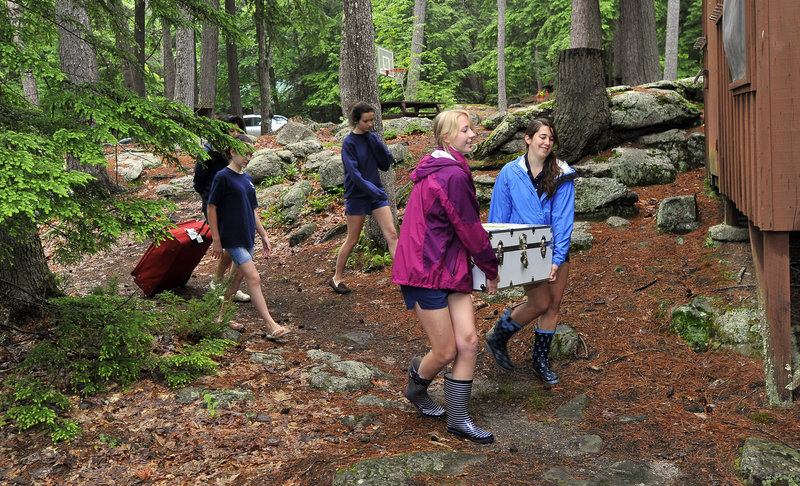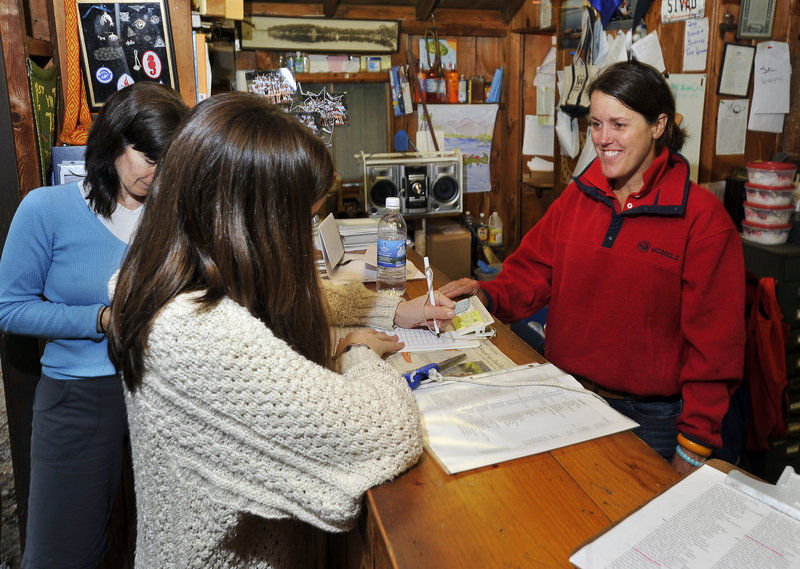RAYMOND – As Lisa Kaiser dropped off her 12-year-old daughter, Jenny, at Wohelo on Thursday, it was hard to tell which one was more excited to be back at the camp on Sebago Lake.
“I would lop off an arm to go here again,” said Kaiser, who was a camper at Wohelo in the mid-1970s.
Through her own experience, Kaiser said, she knows the value of learning to live with one’s peers — and without electricity. But she’s in the minority among her friends back home in Bozeman, Mont.
“They all think it’s nuts that we send her away for seven weeks,” Kaiser said.
As Maine camps welcome thousands of kids from around the world in the coming weeks, camp operators say they’re under more pressure than ever to keep enrollments up.
There isn’t just one reason the traditional overnight camp experience has lost its allure among parents and their children.
For some families, the $1,000-a-week cost is too expensive in a tough economy. And ultra-wired kids aren’t so sure about going to a camp without electricity, let alone Wi-Fi service.
Increasingly protective parents count the miles — or number of states — between them and their children nervously. And increasingly diverse and competitive programs closer to home offer more convenient commutes and tuition.
Collectively, it takes a toll, said Mary Ellen Deschenes of Maine Summer Camps, a group that represents most of the camps in the state.
“Over the last decade, for all camps anywhere, there has been a downward trend” in enrollment, Deschenes said.
Maine camp directors say they once could rely on reputation alone to attract new campers. Now they have to play up their storied histories and century-old traditions through marketing.
The Wohelo camps’ effort shows in a glossy mailer that went out earlier this year.
“Nestled along the beautiful Sebago Lake shoreline, Wohelo gives girls an overnight camp experience steeped in healthy Maine tradition,” it says.
At Maine Teen Camp in Porter, director Matt Pines said the operators have done more recruiting in other countries, where the Maine brand is still strong.
Maine Summer Camps changed its name recently, from the Maine Youth Camping Foundation, to strengthen the image of what the association represents.
“It seemed like we had to do something more overt,” Deschenes said.
The name change and new logo — the sun rising above a forest on a lake — mark the beginning of a $70,000 marketing campaign paid for by the association’s 120 member camps. Previously, Deschenes said, the annual marketing budget was about $3,000.
Andy Lilienthal, president-elect of Maine Summer Camps and director of Camp Winnebago in Fayette, said competing marketing strategies from camps in other states play into parents’ fears of sending their children farther away.
“There’s a lot of, ‘You don’t need to go so far. We have it all right here, a half an hour from your doorstep,”‘ he said.
But, according to Lilienthal, no camping experiences can compare to those in Maine.
“The lakes are cleaner, they’re bigger, they’re deeper,” he said. “By enabling them the ability to really experience unspoiled wilderness firsthand, there are profound life lessons in those experiences.”
At Wohelo, Kaiser said getting away from the distractions of modern life helped her and her daughter learn invaluable skills about communicating and problem-solving.
“You don’t get that at soccer camp. Sorry,” she said.
Staff Writer Leslie Bridgers can be contacted at 791-6364 or at:
lbridgers@mainetoday.com
Send questions/comments to the editors.





Success. Please wait for the page to reload. If the page does not reload within 5 seconds, please refresh the page.
Enter your email and password to access comments.
Hi, to comment on stories you must . This profile is in addition to your subscription and website login.
Already have a commenting profile? .
Invalid username/password.
Please check your email to confirm and complete your registration.
Only subscribers are eligible to post comments. Please subscribe or login first for digital access. Here’s why.
Use the form below to reset your password. When you've submitted your account email, we will send an email with a reset code.